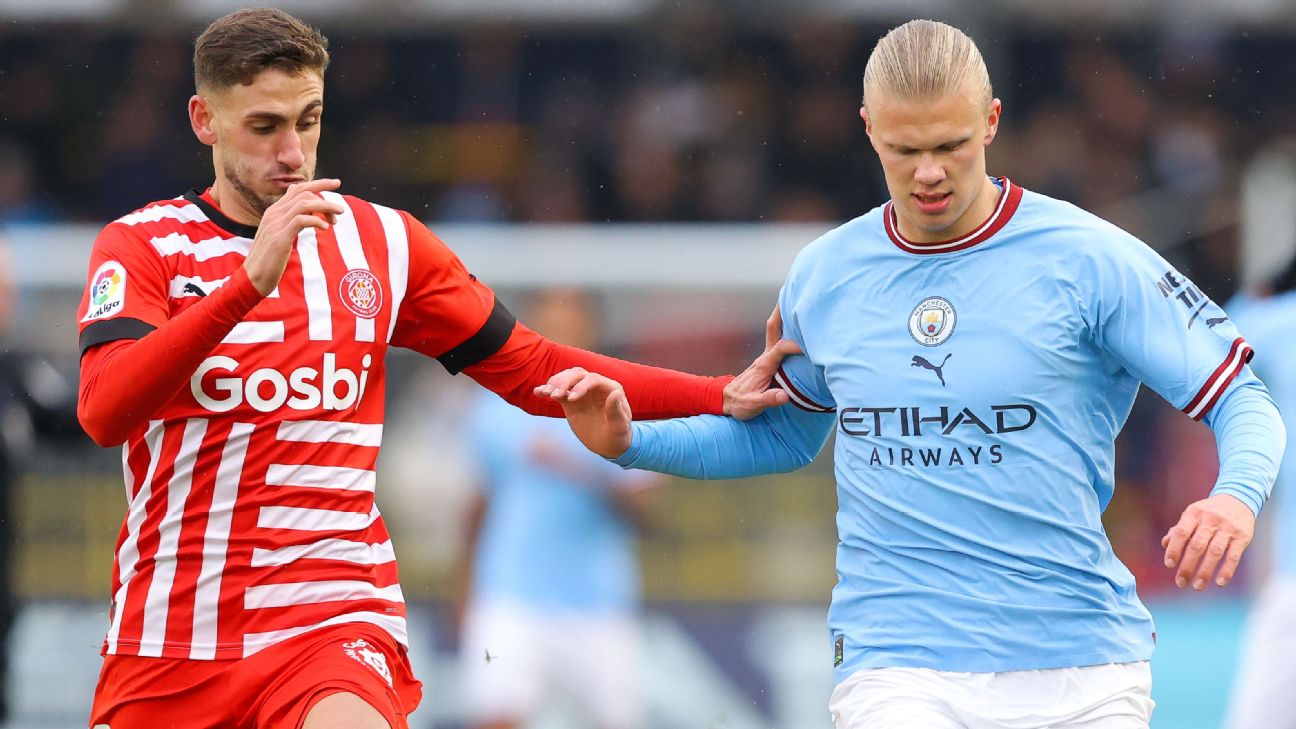Why a fairy-tale LaLiga title for Girona could be bad news for Man City

Picture the scene. Girona are one victory away from winning LaLiga and realising an incredible football fairytale by beating Real Madrid, Atlético Madrid and Barcelona to the title, just two years after promotion from the Segunda Division. But 1,000 miles away, Manchester City have just seen their Premier League title bid falter and the best they can achieve is second spot.
No big deal, right? You can’t be champions every year, not even Pep Guardiola’s dominant City team.
– Stream on ESPN+: LaLiga, Bundesliga, more (U.S.)
But that hypothetical scenario has a strong chance of becoming a reality this season, with Girona top of LaLiga and City five points off top spot in the Premier League. The potential ramifications of that are why multi-club ownership has become such a big issue in football, prompting UEFA president Aleksandar Ceferin to say last year that regulations surrounding club ownership must be “strict.”
It is all about transparency and avoiding the prospect of two or more clubs being controlled by owners with a decisive influence over them. As such, the nightmare scenario for UEFA, and football itself, is the threat of Girona being directed to NOT win LaLiga by their owners in order to ensure that City don’t miss out on a place in next season’s Champions League.
It sounds a far-fetched notion, but under UEFA regulations (article 5.02, to be precise) no two teams from within the same ownership group can compete against one another.
Should two clubs from the same ownership group qualify for the same UEFA competition, the side which finishes highest in its domestic championship gets the place. If the two teams finish in the same position, the one with the highest club coefficient (City in this case) would be awarded qualification. But if Girona win LaLiga and City finish second in the Premier League, Girona would play in next season’s Champions League and City would drop into the Europa League.
That reality is why a remarkable LaLiga triumph for Girona could be very bad news for Manchester City — the satellite club potentially denying the senior team in the group the prestige and financial boost of playing in the Champions League.
There is no suggestion that Girona would be told to ease off in LaLiga simply to prevent City from missing out on a place in the Champions League, but it is the possibility of undue influence that is the issue.
Girona’s club crest is proudly displayed on the wall of the City Football Academy — Manchester City’s training ground — as one of the 13 clubs within the City Football Group (CFG), alongside others including New York City FC, Yokohama F. Marinos, Melbourne City, Palermo and, of course, reigning Premier League and Champions League winners Manchester City.
The links between City and Girona are strong and undeniable. In August 2017, the CFG acquired a 44.3% stake in Girona in an equal partnership with the Girona Football Group owned by Pere Guardiola, the brother of City manager Pep, who now holds the position of Girona chairman. CFG has since increased its stake to 47% while Pere Guardiola now owns 16%, with 35% owned by Marcelo Claure, the president of Bolivian team Club Bolivar, another of the 13 clubs within the CFG group.
In the seven seasons since joining the CFG, which describes itself as “the world’s leading private owner and operator of football clubs, with total or partial ownership of thirteen clubs in major cities across the world,” 15 players have moved directly from City to Girona, either on loan or permanent transfer. Meanwhile, Simon Cliff is listed on the CFG website as its general counsel, while Girona’s website also declares him to be a member of its club board.
Close ties and ownership issues do not just hang over Manchester City and Girona. Sir Jim Ratcliffe’s imminent arrival at Manchester United with a 25% stake in the club and full control over football operations means UEFA will have to act if United and Nice, also controlled by Ratcliffe’s INEOS group, qualify for the same competition. Nice are second in Ligue 1 and on course for the Champions League, so United’s poor season in the Premier League — they sit in eighth position, 11 points adrift of a top-four spot — might delay an awkward conversation in the INEOS boardroom for 12 months at least.
UEFA has found a way around such thorny issues in the past. RB Leipzig and FC Salzburg have been allowed to compete in the Champions League together since 2017, despite both being owned by the Red Bull Group. The RB in Leipzig’s name now stands for “RasenBallsport.” Salzburg have had to drop Red Bull from their name when competing in Europe as UEFA does not permit sponsors’ names in its competitions but, more importantly, they changed the personnel on their board to demonstrate a clear separation in the control of them and Leipzig to ensure they satisfied UEFA’s requirements.
And at the start of this season, UEFA’s Club Financial Control Body accepted the admission to European competition of six clubs despite a potential conflict of interest due to shared ownership models involving Aston Villa and Vitoria Guimaraes, Brighton & Hove Albion and Union St-Gilloise, and AC Milan and Toulouse.
But with the links between City and Girona so clear and so strong, it seems inevitable that UEFA will have a decision to make this summer because both appear to be on course to comfortably secure Champions League qualification. And if Girona win LaLiga and City fail to retain their Premier League title, it could be the catalyst for significant changes in the rules and regulations governing multiclub ownership.
